It’s no wonder, coffee is the fuel (best-loved drink) for millions of people around the world – so chances are, you might be one of those who is habitual of waking up on a morning cup of joe.
For sure, it provides a wonderful elixir of energy every morning to revive your brain into productivity. And without it, your organs might refuse to co-operate.
But the question is: what it does for your health?
It seems like every day, there’s a new study supporting its health benefits but also, its downsides that might leave you confused with the question: Is coffee good or bad for you?
Over the past few decades, coffee has been subjected to disputed debates and science believed that coffee would have negative effects on a person’s health.
It was even added to the list of “possible carcinogens” in 1991 by The International Agency for Research on Cancer (IARC), part of the World Health Organization (WHO).
Mainly, it was due to a handful of studies suggested that coffee drinkers are more likely to have a link to develop bladder cancer.
Now IARC has classified drinking very hot beverages (hotter than 65°C or 149°F) as possible carcinogen that probably cause cancer. But in the United States, coffee, tea and other hot beverages are usually drunk at lower than 149 degrees Fahrenheit.
Furthermore, a group of scientists from 10 different countries re-examined the carcinogenicity of coffee, and as a result found that coffee is unlikely to cause bladder or other certain types of cancers.
In fact, several studies on coffee determined that it reduces the risk of cancer because its beans contain antioxidants which are thought to have a defensive effect against cancer.
Conclusively, now coffee risk has been downgraded and dropped from the list of possible carcinogens.
It’s important to note that the exact mechanism, how coffee reduces the effect of cancer is still unclear and needs more research to understand how it could affect cancer growth and development.
The reassuring news was just to make it clear you’re probably not increasing the risk of cancer. And if you aren’t already drinking the coffee, we won’t suggest you to start because it can still cause some problems in people since it contains a well-known stimulant, caffeine.
What is Caffeine?
Caffeine is naturally occurring stimulant and one of most commonly used drugs that millions of people use to increase wakefulness, fat burning, improving concentration and focus.
It’s mainly used to prepare caffeinated foods and beverages. However, its concentration varies in different caffeinated beverages.
How much caffeine is in most popular caffeinated beverages?
Factors like processing and brewing time affect the caffeine level but you can use these numbers as a guide to keep in check how much caffeine you’re consuming, depending on the type of coffee drink.
|
Coffee Drink |
Size (oz) |
Caffeine (Mg) |
|---|---|---|
|
Coffee |
8 oz |
102-200 mg |
|
Brewed, Decaf |
8 oz |
2 mg |
|
Espresso |
8 oz |
240-720 mg |
|
Espresso, Decaf |
1 oz |
0 mg |
|
Instant |
8 oz |
62 mg |
|
Instant, Decaf |
8 oz |
2 mg |
|
Cocoa beverage |
8 oz |
2-7 mg |
|
Chocolate milk |
8 oz |
2.7 mg |
Please Note: This may not seem like a lot but when you multiply it with the amount of coffee (number of cups) you drink everyday, it becomes a lot to your daily nutrition intake.
So, how much caffeine is too much?
There is no clear-cut answer, you’ll have to evaluate it yourself, the tip of the iceberg is to realize how much caffeine you’re consuming everyday.
According to the MayoClinic, 400 miligrams of caffeine per day appears to be safe for healthy adults which counts about 4 cups of coffee each day. But if you’re consuming more than safe amount or heavy amount of caffeine, you may experience the following side effects:
- Insomnia
- Migraine
- Nervousness
- Restlessness
- Stomach upset
- Rapid heartbeat
- Frequent urination
On the bright side, when you stick yourself to the moderate caffeine consumption every day, these are the potential health benefits that will keep you hooked to your morning java.

Let’s discuss in more detail about how scientists and medical professionals across the world have changed their stance on caffeine as the results of study after study confirm that coffee is more of a friend than an enemy.
1. Improves your brain function
As we’ve already discussed, most popular stimulant in coffee is caffeine, and actually the key reason why coffee boosts your brain functioning in short term (1).
It’s mainly believed to be due to the way caffeine interacts with adenosine receptors, neurotransmitters in the brain that make you sleep.
A handful of studies found that adenosine largely builds up during the day and makes you feel dozy during the night time (2, 3).
Caffeine mainly fights with the adenosine to stop it from binding to its receptors and avert it from slowing your brain functioning.
Interestingly, it also stimulates the brain for the release of other neurotransmitters to improve several other aspects of your brain including mood, attention, learning and overall brain functioning.
However, over the time, you may become tolerant to the effect of caffeine and you’ll have to ingest the more coffee to experience the same spark, suggests to a study by Psychopharmacology.
2. Makes you smarter
Coffee doesn’t just keep you awake, it may also make you smarter.
You might be surprise to know, if you love the smell of coffee, you’ll probably perform better than your peers, reports a study by Journal by Environmental Psychology.
Another study led out by Stevens School of Business along with researchers at Temple University and Baruch College, the purpose of this study was to evaluate whether the coffee scent could be strong enough to boost the cognitive performance of an individual.
In the first study, the researchers gave a 10-question GMAT (a computer adaptive test required by many business schools) Algebra test to nearly 100 under-graduate students and divided the them into two groups.
As a result of this experiment, the researchers found that the students who gave the test in coffee like-scent room performed extremely better than the students who gave the test in an unscented room.
3. Helps you in burning fat faster
Caffeine is one of the most important substances that’s largely used in most commercial fat burning supplements – and for good reason.
It can directly stimulate the adrenaline to promote fat-breakdown and release it into the blood. It does so by increasing the blood level of adrenaline hormones (4, 5).
However, this release of fats into blood doesn’t ensure that you’ll lose weight, of course, this will only be possible if your body burn more calories than you’re consuming every day.
According to a study by the American Journal of Physiology, caffeine consumption could increase fat-burning as much as 29% in lean people and about 10% in obese individuals.
The best thing about caffeine, it can increase the resting metabolic rate (RMR) by 3-11% which makes it easier for you to eat more food without worrying about gaining weight further.
4. Reduces of risk of dementia
Coffee is more than just an enjoyable drink, it may even reduce the chances of developing dementia by 36%, found one study carried out by researchers of University of Wisconsin-Milwaukee.
The study followed the 6467 women (aged 65+) for over 10 years and found that women who consumed an average of 261 mg (about 3 cups of coffee) of caffeine a day are at lower risk of developing probable dementia than women who consumed lower level of caffeine.
Another 2012 key study in Florida reported that people who didn’t suffer from dementia had two times more caffeine in their blood than those who had.
However, it’s important to note that the above studies only suggest there’s a link between caffeine and lower risk of probable dementia or cognitive impairment but it can’t be consider as definitive judgement as it still requires more research to figure out exactly how caffeine can help against dementia.
5. May decrease the risk of depression
Depression affects everybody’s life no matter what their background is. The National Institute of Mental Health reports that nearly 17.3 million adults in the United States had at least one major depressive episode.
However, new research carried out by Harvard School of Public Health researchers had satisfactory outcomes, they found, the affect of depression appears to be decreased with the increase in caffeine consumption.
The researchers studied 50,739 women (average 63 years old) who drank 4 or more cups of caffeinated coffee had experienced 20% lower risk of depression than women who drank little or no coffee at all.
Another study found a link between coffee consumption and decreased risk for depression.
6. Reduces the risk for developing type 2 diabetes
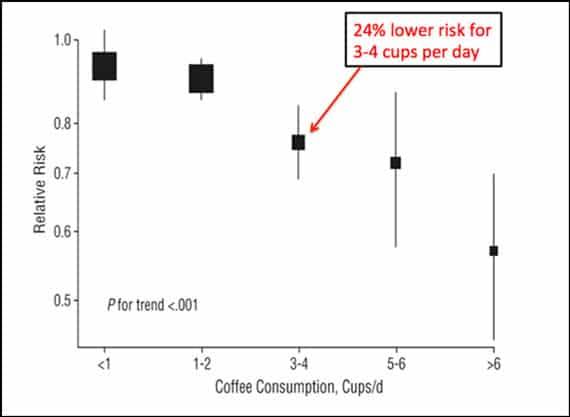
Source: JAMA Internal Medicine
Whether you’re trying to lower your risk or you already have diabetes, this is good news for you that compelling researches on coffee and diabetes suggest that increasing your coffee consumption may reduce the risk of developing type 2 diabetes.
Chinese researchers think this might be due to three active compounds (caffeine, caffeic, and chlorogenic acid) in coffee which can block the toxic accumulation of protein which is believed to be responsible for increasing the risk for type 2 diabetes, reports WebMD.
However, the benefits of coffee varies for diabetes in certain cases.
Researchers at Harvard tracked over 100,000 people for a period of 20-years and according to the results of 4-year concentration, published in a 2014 study, people who increased their coffee ingestion by over a cup per day had an 11% less risks for developing type 2 diabetes.
Conversely, the risk had increased by 17% in people who reduced their coffee consumption by one cup per day.
Additionally, a study by The LANCET suggested that coffee consumption has been shown to acutely reduce insulin sensitivity and associated with a substantially lower risk of type 2 diabetes.
Keep in mind, no food or supplement ensures full protection against type 2 diabetes, however, moderate coffee consumption may reduce its possibilities of evolving further.
7. Lowers the risks of certain type of cancers
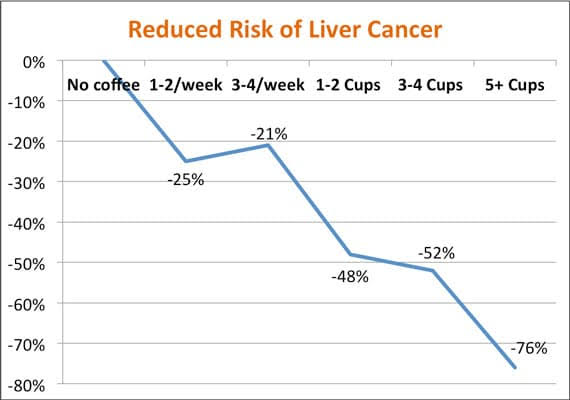
Source: Journal of National Cancer Institute
As we’ve already discussed coffee has been claimed to be responsible for causing cancer, in some earlier studies.
But now larger and better designed studies have shunned all those findings and concluded that coffee is mainly associated with the lowered risk of certain types of cancers including prostate cancer, liver cancer, some cancer of mouth and throat and endometrial cancer, says Cancer.org
And it’s due to acrylamide, a chemical that mainly forms during the coffee roasting process, however, the exact mechanism how it protects against cancer is still unknown.
American Cancer Society experts; Susan Gapstur and Marjorie McCullough say that more research is needed to figure out the exact biological mechanism linked among coffee drinking, acrylamide exposure and cancer risks.
8. May delay the onset of Alzheimer’s
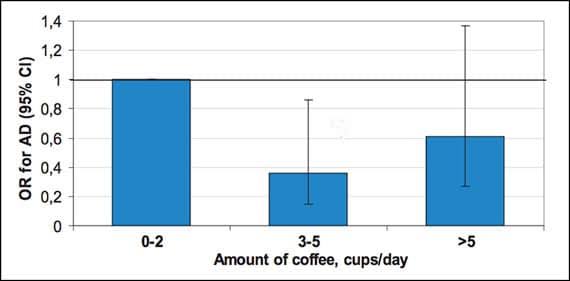
Source: Journal of Alzheimer’s Disease
New study on coffee and Alzheimer’s found that coffee may delay the onset of Alzheimer’s by 50%, reports Alzheimer’s.net.
However, it’s still unknown how coffee does so, but Chuanhai Cao, Ph.D., a neuroscientist at the University of South Florida’s College has a theory that it does so by reducing the amount of beta-amyloid, a protein which is found in the brain of Alzheimer’s patients.
The neuroscientist Chuanhai Cao added:
Caffeine inhibits the production of beta-amyloid, so your system only metabolizes all of the available protein.
He also mentioned:
There is no reason to stop drinking coffee if you are experiencing memory problems.
Chuanhai Cao suggested from the result of the study that older adults who drink moderate level (about 3 cups) of coffee a day will not be suffered from Alzheimer’s or at least experience a noticeable delay before converting to it.
9. Reduces risk of Parkinson’s Disease
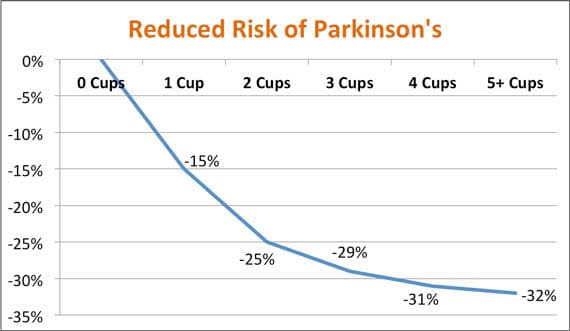
Source: Geriatrics and Gerontology International
Nearly 60,000 Americans are diagnosed with Parkinson’s disease each year, reports Parkinson.org.
Currently, there’s no cure for it and modern treatment can only help fighting against the symptoms. However, studies over the years suggested that coffee might help reduce the risk of Parkinson’s disease (6).
According to a recent study by Krembil Brain Institute, drinking coffee may protect you against both Alzhemier’s and Parkinson’s disease. The researchers mentioned that the components in the coffee can be beneficial for warding off cognitive decline but can’t be considered as cure, absolutely not!
10. At times excellent for liver’s functionality
Coffee might be really good for you in many other ways but especially for liver, says WebMD. Researcher found that java drinkers might be less likely to develop liver cancer and other related diseases.
A recent study led by Emily Hu reported that people who drank 3 or more cups of coffee a day, had 21% less chances for hospitalizing for any liver-related illness.
In fact, World Journal of Hepatology referred coffee as magical bean for liver diseases.
11. Reduces the risk of stroke
If you’re coffee lover, this is also a good news for you because recent studies on coffee also supports that it doesn’t cause or increase of stroke if you’re good in health (7).
In fact, multiple research found consumption of 2-4 cups of coffee may reduce the risk of stroke and it’s mainly believed to be due to the way coffee changes the blood vessels in physiology and alters the blood flow in a way that it helps prevent hypertension (8).
You may also be surprised to know that coffee can be beneficial for people who have already experienced. In one experiment, it was found that patients who consumed enough caffeine, performed well in postural balance than they had done before ingesting caffeine.
12. May improve your gut health
“If you love coffee, enjoy it. Follow your gut, says Dr. Li Jiao, an associate professor of medicine-gastroenterology at Baylor College of Medicine in Houston.
A team of researchers led by Dr. Li Jiao presented in their recently carried out study that drinking coffee can provide healthier gut microbiome.
The Jiao’s team followed the 34 participants, found that who consumed several cups of coffee per day have better gut health microbiomes profiles than those who drank smaller amount or no coffee at all.
However, Dr. Jiao mentioned, it still requires more research to find out how bacteria and our bodies interact to impact our health.
13. Lowers the rate of dying at an early age
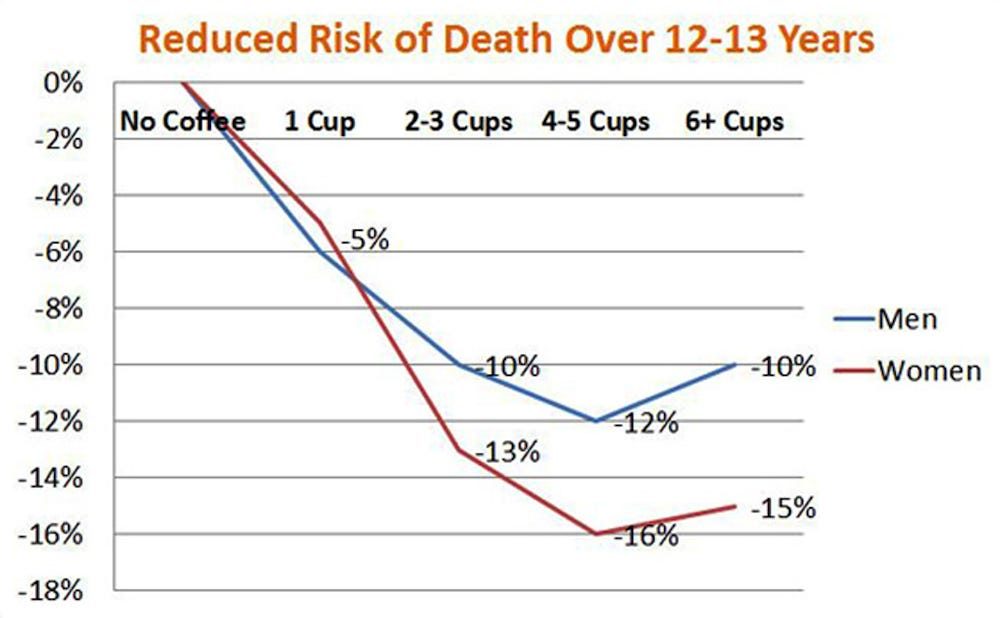
Source: New England Journal of Medicine
Study after study shows that coffee is actually good for you.
Now a 2017 study, published in European Society of Cardiology found that higher coffee consumption is associated with a lower risk of death at early ages. Period.
This study analyzed nearly 20,000 participants (average 37.7 years old) for a period of 10 years. In this duration 337 individuals died, the researchers found that people who drank at least 4 cups of coffee a day had 67% lower chances of death at early ages than those who consumed lower or almost never consumed coffee.
Another study published in Annals of Internal Medicine found that increased coffee consumption was associated with lower risk for cause-specific mortality among non-white populations.
Despite being one of the healthiest caffeinated beverages in the world, coffee can still can’t be the part of medicine required for healing.
Here are the most common drawbacks that may make this mug of heaven a horrifying poison for you.
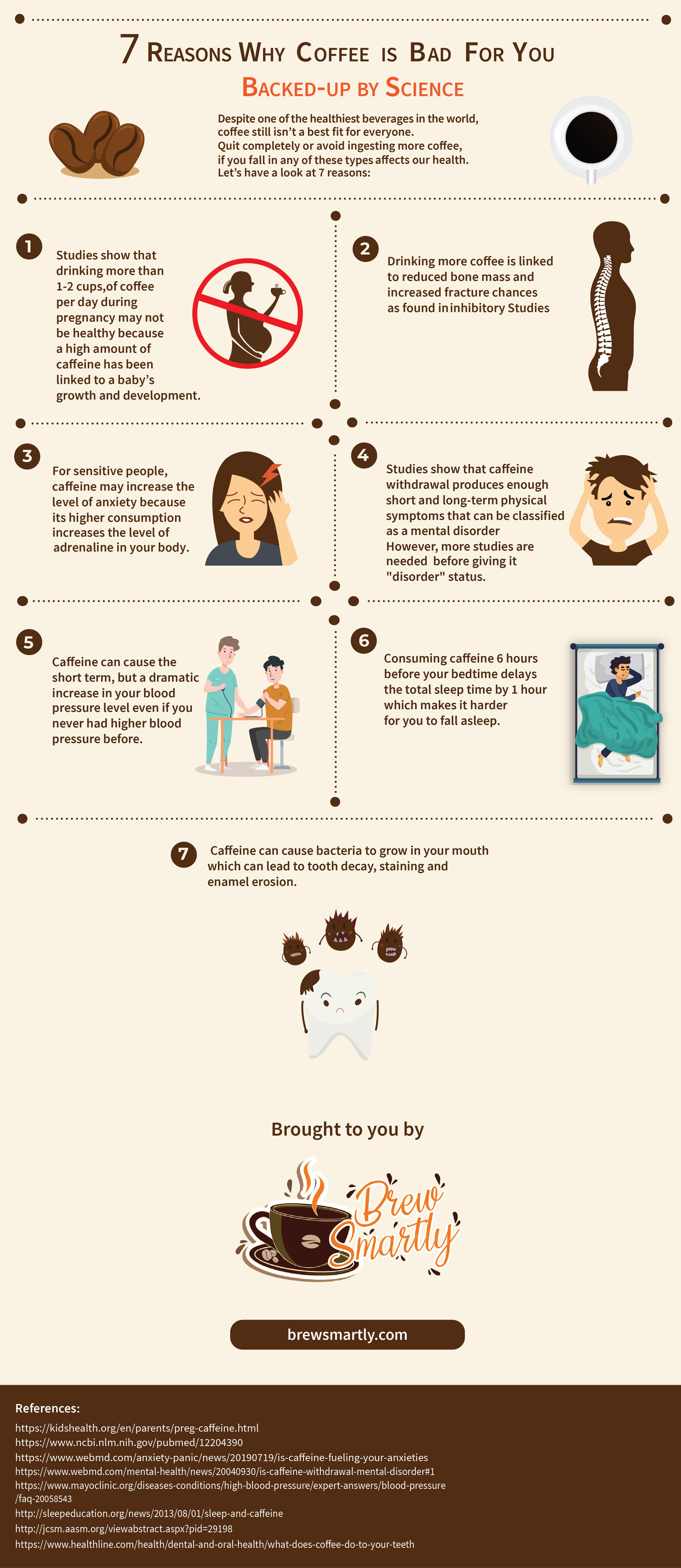
Let’s discuss in detail, why to limit the coffee consumption or stop drinking it immediately.
1. May cause miscarriage or pregnancy loss
Pregnancy seems like a scary time not only because all of a sudden you’re carrying a tiny infant inside you but also because there are hundreds of people try to terrify you with their hair-raising stories.
But if you’re a java lover, you must be aware whether drinking coffee is safe during your pregnancy or not.
According to the various news sources, women who are trying to perceive or are pregnant should cut out caffeine entirely especially during the first 8 weeks, because even an occasional coffee consumption can cause a miscarriage or pregnancy loss.
However, the science isn’t quite as alarming as it sounds. This isn’t the first study of caffeine use in pregnancy, it’s not even the biggest one to the date.
Overall, best evidences seem to indicate that smaller caffeine consumption is unlikely to cause any risk of miscarriage, but we also can’t rule out the risk completely (9, 10, 11, 12).
The convincing research on caffeine indicates that only the higher caffeine consumption can cause babies to have to low birth weights. This is why, leading organization like World Health Organization and National Health Service suggest pregnant women limit the coffee ingestion by 200 mg, about 2 cups a day.
It’s worth noting that amount of caffeine varies a lot in different types of coffee. For instance, a cup of instant coffee has pretty standardized but espresso can have a little or far more caffeine in it, depending on the range of factors.
2. May cause bone mass loss
Some observational studies found that drinking coffee can drain calcium from your body and contribute to osteoporosis. However, other studies on coffee and bone mass didn’t find such a link.
In particular, a 2013 Swedish study followed 61,000 women roughly for 20 years. It was found that drinking 4 cups of coffee or more was associated with a minimal reduction in bone mass but it wasn’t associated to an increased risk of fracture any way.
Even the consumption of 8 cups of coffee a day “isn’t linked to significant concern regarding risk of fracture and fall” reports a 2017 study by Food and Chemical Toxicology.
So, you need to worry about losing bone mass with caffeine consumption only if you aren’t getting enough calcium from other sources in its first place.
3. May increase the level of anxiety in sensitive people
You already know, over consumption of caffeine can make you feel jittery and nervous. Overall, the caffeine consumption is bad for people with anxiety, say Susan Albert Bowling.
The natural effect of caffeine can trigger a host of sensations, such as your heart beats faster, your body begins to heat up, your breathing rate becomes noticeably faster – all that sparks the sensation of anxiety.
According to Susan Bowling (a psychologist at the Women Health Centre), consuming more than 200 mg of caffeine per day can increase the chances of anxiety and panic attacks in people who are sensitive to it.
So, If you’re prone to post-caffeine anxiety feelings, you should eliminate all caffeine consumption while keeping the rest of your diet and activities the same.
On the bright side, if you’re not struggling with anxiety, there’s no need cut back on caffeinated coffee, says Lauren Slayton, RDN.
4. Caffeine withdrawal may cause mental disorder
This might be shocking for you, but the caffeine withdrawal is very real and produce enough physical symptoms, reports WebMD.
In other words, people who don’t get usual dose of caffeine, there are chances, they can be suffered from a range of short and long-term withdrawal symptoms.
- Headache is very common, at least 50% of people experience this in caffeine withdrawal
- Drowsiness
- Irritability
- Difficult concentrating
- Nausea
- Muscle pain
- Vomiting
It’s effect would be minimal or as much severe as you won’t be able to leave your house, won’t be able to function properly, Griffiths told WebMD.
Should you quit?
Experts on WebMD.com say that caffeine withdrawal produce physical symptoms, doesn’t mean it’s dangerous. You can stop drinking coffee but the best way is with a gradual withdrawal.
Just don’t quit immediately otherwise it may cause more physical symptoms than usual.
5. May dramatically increase your blood pressure
Caffeine can cause short but obvious increase in blood pressure even if you never had higher blood pressure before.
It’s still unclear what causes this spike in blood pressure level, says MayoClinic. However, some researchers believe that caffeine does so by blocking a hormone that’s responsible for keeping your arteries widened.
Coffee drinkers usually have higher blood pressure than other people but with the time, people develop tolerance to caffeine so this doesn’t cause a long-term effect on their blood pressure.
If you’re concerned about caffeine’s effect on your blood pressure, it’s always suggested to limit your caffeine consumption by keeping it below than 200 mg per day.
Also avoid consuming caffeine before activities which cause an increase in blood pressure such as exercise, weightlifting or other hard physical laboring.
6. Caffeine can affect your sleep badly
Caffeine can have a disruptive effect on your sleep. In other words, it can make it harder for you to fall asleep or you may wake up more often while sleeping.
According to a study published in Science Translation Medicine, caffeine can disturb the timing of your sleeping clock. This not only reduces your sleeping hours but also affects its quality.
Another study by JCSM, reports that consuming caffeine 6 hours before your sleep time can reduce your total sleep by 1 hour.
In order to reduce its negative effect on your sleeping, try limiting its consumption or avoid taking it before your sleeping hours. You can drink it during the day time like at 2PM, this will given enough time to metabolize caffeine in your body so you’d be able to sleep better during nights.
7. Can stain your teeth
Frequent coffee consumption may stain your teeth.
Tannins that are most commonly found in red wines, are also present in your coffee. These cause color compounds to stick to your teeth and leave an unwanted yellow hue behind that’s difficult to remove.
The more coffee you’ll consume, more your teeth will become yellow.
In order to get rid of stains, drink plenty of water, try brushing your teeth with baking soda twice a month and schedule your regular appointments with your dentist. This may even whiten your teeth within a couple of months.
The Bottom Line: Should You Drink Coffee or Not?
Some people – especially the pregnant women should avoid or limit its consumption severely.
People with high blood pressure, anxiety and insomnia should also cut down its intake for a while to see if it helps.
And don’t worry too much about the headlines. The reality often isn’t as scary as the stories make it seem.
Coffee intake more likely have positive effects on the health of most people, according to scientific evidence.
If you don’t already drink coffee, you shouldn’t start doing it just because of its benefits. There are downsides as well.
But if you already drink coffee and enjoy its spark then stick to it as its benefits outweigh the negatives with a good margin.
You may also be interested in:
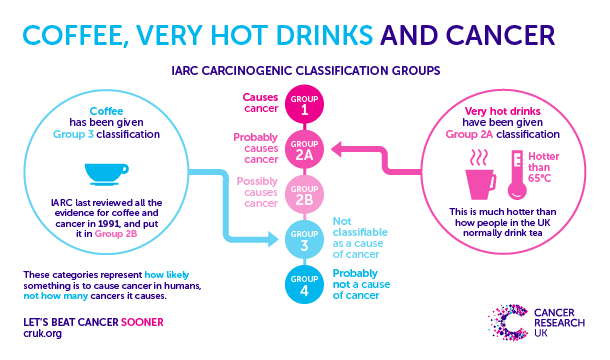
It’s amazing to learn that drinking coffee regularly can provide an energy boost while reducing the risks of cancer. My brother is interested in looking for things that can make him healthy since he’s eating nothing other that fastfood for the past 3 months. I’ll go ahead and share this with him so he could use a coffee delivery service for our home.
Wow, I had no idea that caffeine is an active ingredient when it comes to fat burning! My friend saw a couple of coffee beans around the supermarket in our area. I’ll keep this in mind and consider purchasing some so that I can incorporate this into my diet!